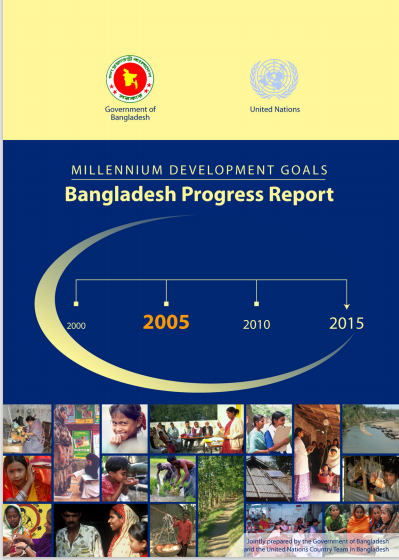In this report, the country level implementation status and commitments made in ICPD 1994 are reviewed and assessed. The gaps and barrier to implementation, factors facilitating implementation and new priorities or emerging issues are also identified. To accelerate the process to achieve the expected goals with respect to areas where implementation is lagging behind, the feasible steps and opportunities are highlighted. In order to renew the commitment and ownership for the Cairo Agenda, the goals achieved and the tasks lagging behind are identified and the steps necessary to attain a sustainable system are proposed. Bangladesh has made remarkable progress in different sectors since the adoption of International Conference on Population and Development Programme of Action in 1994.
Found 161 Results From

A training handbook of 7th five year plan
 February 16, 2021
February 16, 2021 In October 20, 2015, National Economic Council (NEC) headed by the Honourable Prime Minister approved The Seventh Five Year Plan (FY2016-FY2020) entitled “Accelerating Growth, Empowering Citizens”. The plan succeeded the Sixth Five Year Plan and serving as a principal document to continue the unfinished agenda of The Perspective Plan of Bangladesh: Making Vision 2021 a Reality. The Seventh Five Year Plan is a vast policy and strategic document encompassing a wide array of issues ranging from assessment of progress made in the Sixth Five Year Plan to macroeconomic framework to sector specific strategies setting quantitative and qualitative targets. For this reason, it is seemingly a colossal task to identify both quantitative and qualitative targets set in the plan by the respective Ministries/Divisions for implementation

MDGs to Sustainable Development Transforming Our World- SDG Agenda for Global Action (2015-2030)
 February 16, 2021
February 16, 2021 This booklet on Bangladesh's MDGs achievements and the process of formulation of Post2015 Development Agenda was prepared with the aim to be used by Bangladesh Delegation led by Hon'ble Prime Minister Sheikh Hasina in the 70th UNGA to be held from 15-30 September 2015 in New York, USA.

MDG Progress Report 2015
 February 16, 2021
February 16, 2021 Bangladesh has made outstanding progress in MDGs achievement. She has already met several targets of the MDGs like reducing headcount poverty and poverty gap ratio, reducing the prevalence of underweight children, attaining gender parity at primary and secondary education, under-five mortality rate reduction, containing HIV infection with access to antiretroviral drugs, children under five sleeping under insecticide treated bed nets, cure rate of TB under DOTS and others. In addition, Bangladesh has made remarkable progress in, increasing enrolment at primary schools, lowering the infant mortality rate and maternal mortality ratio, improving immunization coverage and reducing the incidence of communicable diseases

MDG Progress Report 2013
 February 16, 2021
February 16, 2021 The Millennium Development Goals: Bangladesh Progress Report 2013 is the seventh Bangladesh MDGs Progress Report prepared by the General Economics Division (GED), Planning Commission following publication of previous status reports in 2005, 2007, 2008, 2009, 2011 and 2012.

MDG Progress Report 2005
 February 16, 2021
February 16, 2021 This, the first Bangladesh MDG Progress Report, has been prepared jointly by the Government of Bangladesh1 (GoB) and the UN Country Team2 in Bangladesh in consultation with other stakeholders. The objective of this report is to monitor the progress of the MDGs for advocacy purposes. This report will contribute to a substantive discussion on specific policies in the ongoing Bangladesh PRSP process. The report also holds significant relevance for the country programme planning of the UN agencies under the forthcoming Bangladesh UNDAF 2006-2010.

MDG Needs Assessment & Costing 2009-2015
 February 16, 2021
February 16, 2021 The MDG Needs Assessment and Costing for Bangladesh is a joint effort of the UN family and the Government of People's Republic of Bangladesh to estimate the resources needed for achieving MDGs in Bangladesh by 2015. The focal points for the activity are the General Economics Division (GED), Planning Commission, Government of Republic of Bangladesh and United Nations Development Programme (UNDP).

Creation of planning commission
 February 16, 2021
February 16, 2021 Rapid improvement of living standard of the masses was the prime goal of Bangladesh liberation struggle in 1971. This vision for higher living standard for the masses has been enshrined in the Bangladesh Constitution. The state of Bangladesh through its Constitution (article-15) committed to a higher living standard for its people by providing basic needs to all its citizens through planned development. With this objective of planned development for the country, the Bangladesh Planning Commission was established in January 1972.The Bangladesh Planning Commission had its roots in pre-independence Bangladesh. In the mid-1950s a Provincial Planning Board was established under the United Front Government of the then East Pakistan (present Bangladesh).
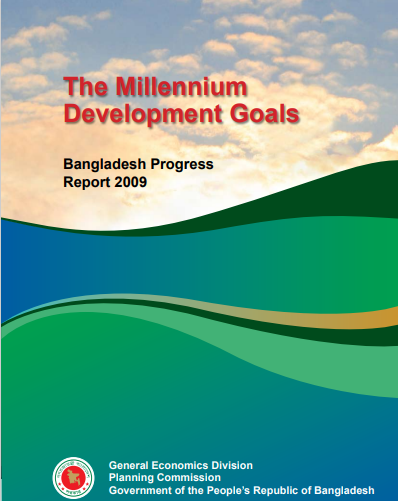
MDG Progress Report 2009
 January 25, 2021
January 25, 2021 Millennium Development Goals: Bangladesh Progress Report 2009’ is the fourth attempt at stocktaking of the status of all the MDGs in Bangladesh after the reports published in 2005, 2007 and 2008. The report is prepared with the help of Thematic Working Groups constituted in concerned ministries along with the assistance from the UN System. In order to coordinate and facilitate preparation of the Bangladesh Country Report, a Steering Committee headed by Member, GED and a Working Committee headed by Division Chief, GED were constituted.
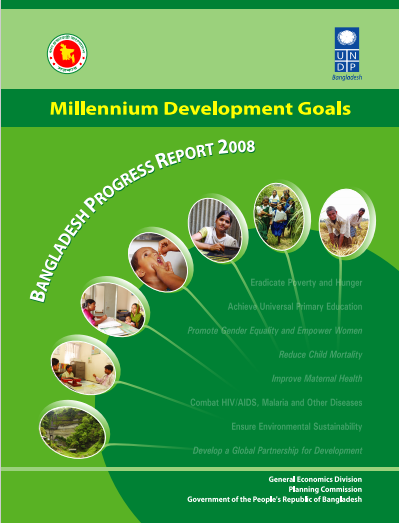
MDG Progress Report 2008
 January 25, 2021
January 25, 2021 Millennium Development Goals: Bangladesh Progress Report 2008’ is the third report on the progress monitoring of MDGs in Bangladesh after the years 2005 and 2007. The report is prepared with assistance from the “Support to Monitoring PRS and MDGs in Bangladesh” Project. The report for the first time also analyzed the MDG indicators at sub-national level. The report puts together the status and trends in advancement of the MDGs in Bangladesh. It also indicates some challenges of achieving MDGs in several key areas such as in improving maternal health, retaining of students at the primary level to complete primary education, gender parity in tertiary education, quality issues in accessing safe drinking water and improved sanitation and the low use of information and communication technology. The report captures the progress of the MDG indicators after the last mid-term MDG report of 2007. The report shows that Bangladesh has achieved remarkable progress in the areas of primary schooling, gender parity in primary and secondary level education, lowering the under-five mortality rate, reducing the incidence of communicable diseases and indicators on the environmental changes. The reduction of hunger and poverty are well posed to reaching their respective targets, provided macroeconomic stability, economic growth and employment creation trend remain stable in the remaining period.

MDG Needs Assessment & Costing 2009-2015
 January 25, 2021
January 25, 2021 The MDG Needs Assessment and Costing exercise for Bangladesh emanates from a joint effort of the Government of People's Republic of Bangladesh and UNDP to estimate the resources needed for achieving MDGs in Bangladesh by 2015. The focal point for the activities has been the General Economics Division (GED), Planning Commission, through implementing the project titled ' Support to Monitoring PRS and MDGs in Bangladesh' supported by UNDP. The Report has put together the status and trends in progress of achievement of MDGs in Bangladesh, the challenges ahead, the major interventions and targets for MDGs, as well as the resources requirements for attaining MDGs by 2015.

MDG Mid-Term Progress Report 2007
 January 25, 2021
January 25, 2021 Following the Millennium Declaration of the United Nations adopted on 8 September 2000 by all member states, the UN Secretariat immediately drew up a list of 8 MDGs, each of them accompanied by specific targets and indicators. There are 18 targets and 48 indicators. All pertain to combat poverty, hunger, illiteracy, disease, inequality between man and women, infant mortality, maternal mortality, environmental degradation and improving global partnership for development. Bangladesh is committed to achieve the MDGs within stipulated time, i.e. by 2015. MDGs with their targets have been accommodated in the Bangladesh PRSP, titled ‘Unlocking the Potential: National Strategy for Accelerated Poverty Reduction’ (NSAPR). The Medium Term Budgetary Framework (MTBF) and successive Annual Development Programmes (ADPs) have also been tuned with the MDGs.

MDG Financial Strategy 2011
 January 25, 2021
January 25, 2021 Millennium Development Goals (MDGs) was set up in September 2000 at the Millennium Summit by the member states of the United Nations, committing themselves to a series of targets under the following eight goals – (i) eradicate extreme poverty and hunger, (ii) achieve universal primary education, (iii) promote gender equality and empower women, (iv) reduce child mortality, (v) improve maternal health, (vi) combat HIV/AIDS, malaria and other diseases, (vii) ensure environmental sustainability, and (viii) develop a global partnership for development – which are to be achieved by 2015.
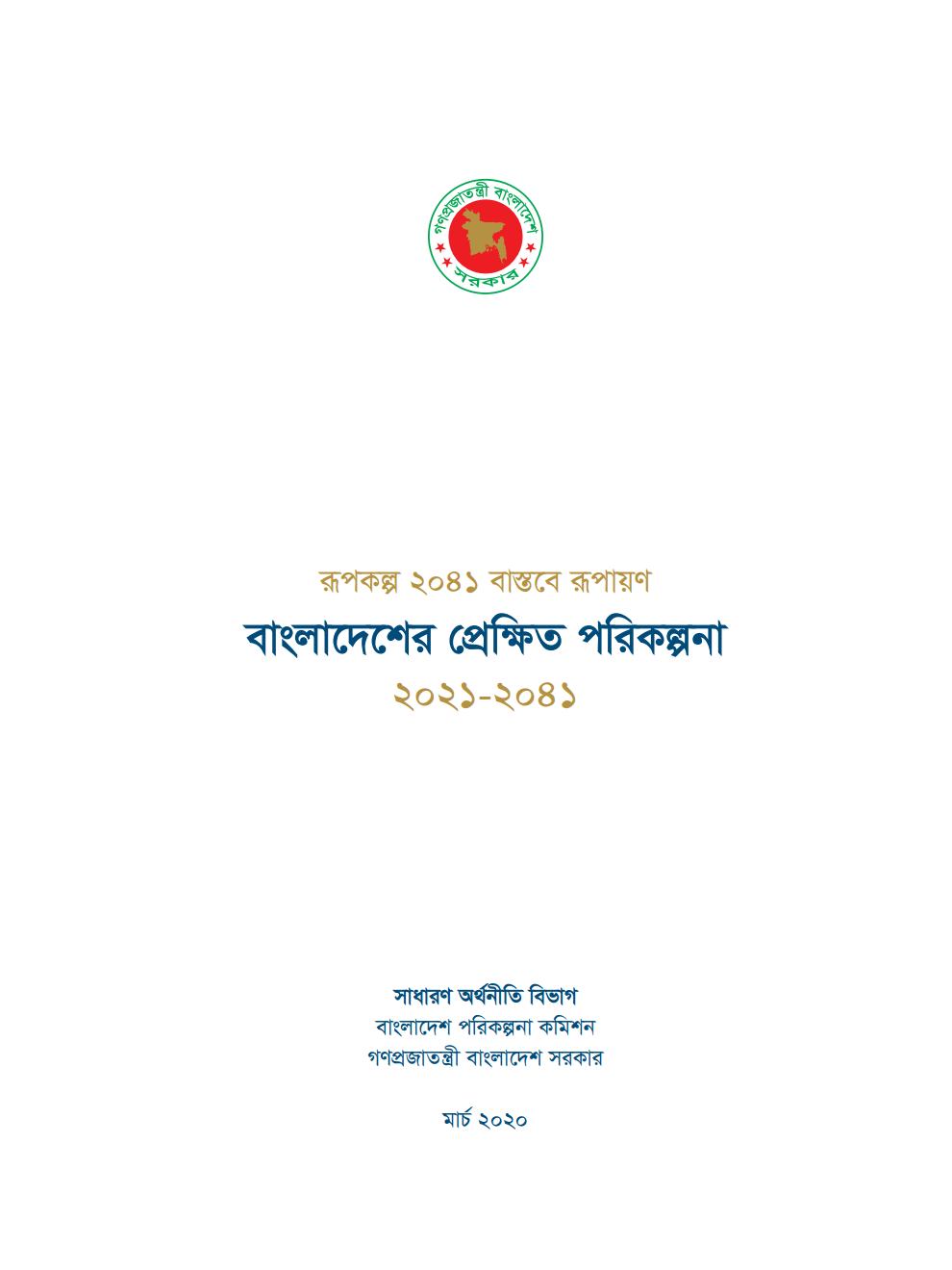
রূপকল্প ২০৪১ বাস্তবে রূপায়ণ: বাংলাদেশের প্রেক্ষিত পরিকল্পনা ২০২১-২০৪১
 March 6, 2020
March 6, 2020 ২০১৫ সালে নিম্ন আয়ের দেশ থেকে নিম্ন-মধ্য আয়ের দেশের শ্রেণীভুক্ত হয়েছে এবং দশক ব্যাপী ৭ শতাংশ হারে গড় জিডিপি প্রবৃদ্ধি অর্জনও সম্ভব হয়েছে। সাফল্যের এই ধারায় উজ্জীবিত হয়ে বর্তমান সরকার জাতির জনক বঙ্গবন্ধু শেখ মুজিবুর রহমানের স্বপ্নের সোনার বাংলা বাস্তবায়নের জন্য একটি দীর্ঘমেয়াদি পরিকল্পনা হাতে নিয়েছে। স্বপ্নের সেই দেশ হবে দারিদ্র্যমুক্ত সাম্য ও ন্যায়ের সমৃদ্ধ এক দেশ, যেখানে উন্নয়নের অংশীদার হবে সকলে। মূলত: রূপকল্প ২০২১- এর সাফল্যের ধারাবহিকতায় বঙ্গবন্ধুর উন্নয়ন দর্শনের আলোকে স্বপ্নের উন্নয়ন পথে জাতিকে এগিয়ে নেয়ার লক্ষ্যেই সরকার “রূপকল্প ২০৪১” গ্রহণ করেছে। এই রূপকল্পের প্রধান অভীষ্ট হলো ২০৩১ সালের মধ্যে চরম দারিদ্র্যের অবসান ও উচ্চ-মধ্য আয়ের দেশের মর্যাদায় উত্তরণ এবং ২০৪১ সালের মধ্যে দারিদ্র্যের দ্রুত অবলুপ্তিসহ উচ্চ-আয় দেশের মর্যাদায় আসীন হওয়া। রূপকল্প ২০৪১ কে একটি উন্নয়ন কৌশলে রূপান্তরের জন্য প্রয়োজনীয় নীতিমালা ও কর্মসূচিসহ এই দলিলটিতে সন্নিবেশিত হয়েছে ‘রূপকল্প ২০৪১ বাস্তবে রূপায়ণ: বাংলাদেশের প্রেক্ষিত পরিকল্পনা ২০২১-২০৪১’।
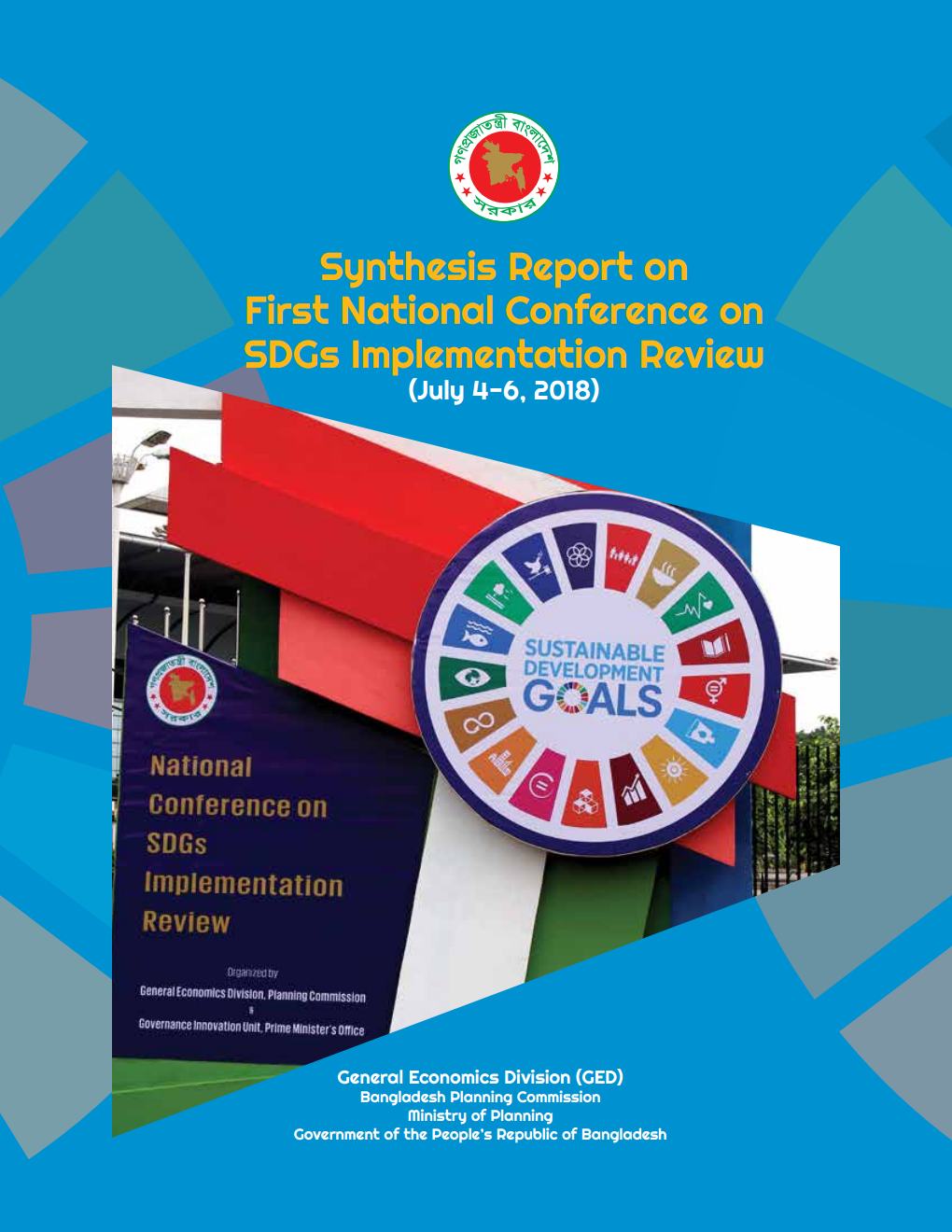
Synthesis Report on First National Conference on SDGs Implementation Review
 November 23, 2018
November 23, 2018 In the development discourse, it is now mooted that political ownership of Sustainable Development Goals (SDGs) and their integrating with the national development strategies are two most important preconditions for successful implementation of SDGs. Sheikh Hasina, the Hon’ble Prime Minister of Bangladesh, has a unique opportunity to remain present and be the signatory to both the Millennium Declaration and the SDGs Declaration held in the UN General Assembly in 2000 and 2015 respectively. Under her visionary leadership, Bangladesh has conspicuous success stories with respect to the implementation of Millennium Development Goals (MDGs). The feat and global acclamation for MDGs have encouraged the political masters of Bangladesh to own SDGs and align it with the national on-going 7th Five Year Plan (2016-20), the cornerstone for national development. In order to ensure that no one is left behind, it is suggested that a robust, voluntary, effective, participatory, transparent and integrated follow-up and review framework will make a vital contribution to implementation of SDGs, and will help countries to maximize and track progress in implementing the Agenda 2030. As part of systematic follow-up and review of implementation of the agenda 2030 at the national level, the Government of Bangladesh for the fist tie organized a National Conference on SDGs Implementation Review (SIR) during 4-6 July, 2018. The focus of the conference was to apprise different stakeholders about the implementation status of SDGs for the last two and half years. The conference brought together the Ministers, Senior Officials, NGOs, CSOs, Development Partners, Academia, researchers, right activists, and private sectors. Senior officials from Ministries/Divisions of the Government of Bangladesh, Development Partners, NGOs and CSOs presented their reports in plenaries and in different sessions followed by questions & answer. The presentation highlighted actins already taken, identified challenges and charted future course of actions. In three days, around 2000 participants registered and participated in this fist national conference.





